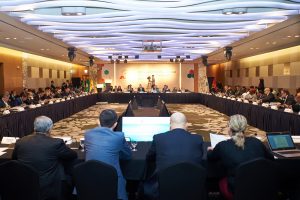 On October 24, the 8th Session of the Assembly and 12th Session of the Council of GGGI (Joint Session) was held within GGGW2019. Delegates from thirty-six member countries, including observer countries and regional and intergovernmental organizations, of GGGI convened for the meeting.
On October 24, the 8th Session of the Assembly and 12th Session of the Council of GGGI (Joint Session) was held within GGGW2019. Delegates from thirty-six member countries, including observer countries and regional and intergovernmental organizations, of GGGI convened for the meeting.
The opening statement of the meeting was delivered by Mr. Ban Ki Moon, who was re-elected as the President of the Assembly and Chair of the Council unanimously by all members and will be serving his term for another two years.
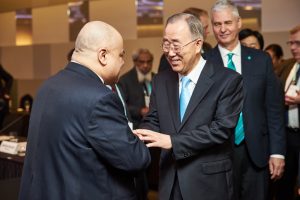 At the Assembly and Council this year, the final version of Strategy 2030 was presented, which includes future-oriented gradual plans to achieve comprehensive goals for Global Green Growth. Strategy 2030 is the new long-term corporate strategy that sets the course for GGGI’s efforts, over the next ten years, to respond effectively to the changing environment and its Member countries needs and growing ambitions.
At the Assembly and Council this year, the final version of Strategy 2030 was presented, which includes future-oriented gradual plans to achieve comprehensive goals for Global Green Growth. Strategy 2030 is the new long-term corporate strategy that sets the course for GGGI’s efforts, over the next ten years, to respond effectively to the changing environment and its Member countries needs and growing ambitions.
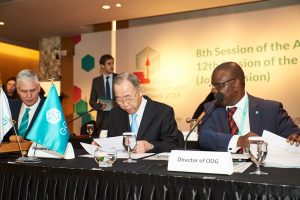 Following the fast-changing contextual trends, including the key agreements from the United Nations SDGs and the Paris Climate Agreement, along with growing interest towards alternative economic models, mainly three key issues have been suggested within Strategy 2030 – Adapt, Invest, and Transform – as future navigators. The vision and missions of GGGI is as follows: A low-carbon, resilient, world of strong, inclusive and sustainable growth and the member countries’ transformation to a green growth economic model.
Following the fast-changing contextual trends, including the key agreements from the United Nations SDGs and the Paris Climate Agreement, along with growing interest towards alternative economic models, mainly three key issues have been suggested within Strategy 2030 – Adapt, Invest, and Transform – as future navigators. The vision and missions of GGGI is as follows: A low-carbon, resilient, world of strong, inclusive and sustainable growth and the member countries’ transformation to a green growth economic model.
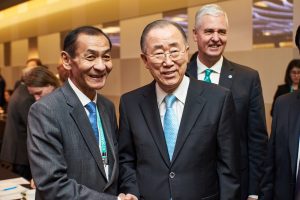 By serving the essential and socially inclusive policies, member countries of GGGI will demonstrate plans to implement green growth development, dedicated to a low-carbon and climate-resilient economic model. Generating more green jobs, enabling easier access to climate finance, and increasing financial investment and partnerships will accelerate the pace of member countries’ green growth transformation.
By serving the essential and socially inclusive policies, member countries of GGGI will demonstrate plans to implement green growth development, dedicated to a low-carbon and climate-resilient economic model. Generating more green jobs, enabling easier access to climate finance, and increasing financial investment and partnerships will accelerate the pace of member countries’ green growth transformation.
Strategy 2030 set GGGI’s two strategic goals. The Strategic Goal One is a programmatic goal: By 2030, the economies of GGGI’s Member countries will have transformed into a low-carbon and resilient economic development model with GGGI’s support to maximize their green growth outcomes, NDC implementation, and the relevant SDG commitments.
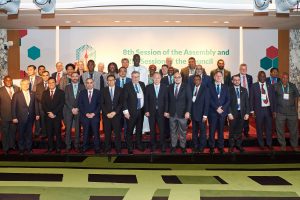 The Strategic Goal Two is a non-programmatic goal: By 2030, GGGI will be a world-leading, effective, and agile intergovernmental organization that is respected, financially sustainable, efficient, transparent, accountable, and considerate of its people. To achieve its mission and vision, GGGI’s efforts in delivering its products and services to Member countries and the way it runs and manages the organization was underscored by the strategic goals at the Assembly.
The Strategic Goal Two is a non-programmatic goal: By 2030, GGGI will be a world-leading, effective, and agile intergovernmental organization that is respected, financially sustainable, efficient, transparent, accountable, and considerate of its people. To achieve its mission and vision, GGGI’s efforts in delivering its products and services to Member countries and the way it runs and manages the organization was underscored by the strategic goals at the Assembly.
Additionally, the Director-General presented an overview of GGGI’s performance in 2019, and the Chair of the MPSC was invited to present a report of the Management and Program Sub-Committee. In order to deal with the Institute’s progress on Management and Operations, GGGI’s Work program and Budget 2019-2020, and GGGI Finances were discussed as well during the session.
For the last part of the Assembly and the Council Session, election of Members of the Council for 2020-2021 took place, as well as the appointment of Expert/Non-State Actors to serve on the Council.